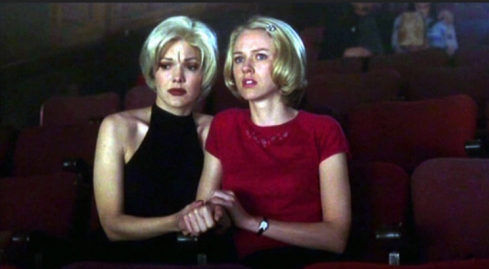David Lynch is not usually my cup of tea, but when my adult daughter suggested I view Lynch’s “Mulholland Drive”, I decided to take the plunge. I’d seen “Eraserhead” in my 20s but I don’t recall leaving the theater with a song in my heart. I’d also seen “The Elephant Man” (1980) and liked it well enough. Dune (1984) was the only other David Lynch film I’d seen, and that one had been a misfire from the word go. I was too chicken to see “Blue Velvet”, “Wild at Heart”, or “Lost Highway”, but what the heck, “Mulholland Drive” it would be.

“This movie sure is weird”
This is a film that is more fun to talk about than it is to actually watch. That sounds like a criticism, but I honestly don’t mean it that way – it is really fun to discuss this film with others after viewing it. It’s a film that’s hard to pin down. One could say that it is a psychological drama, or perhaps a hodgepodge of film genres (gangster films, Hitchcock thrillers, mysteries, musicals, Westerns.) You could call it a disjointed tale with kitschy symbols (keys, boxes, a surreal theater) and other scenes that have little relationship to the story(ies) of its two main characters. Is the first part of the film a dream that Naomi Watt’s character Betty Elms has in the “real” world of the second part of the film? At one point, I thought of Terry Gilliam’s “Brazil.”
On the other hand, that may be taking this film too seriously. Is the film just an intriguing put on? There are several darkly funny scenes that are tangential to the main drama. In one, a man describes a frightening dream he has had while sitting in the very restaurant that the dream took place. In another, a semi-competent hitman bungles the job and has to improvise. What the heck is Lynch doing?
Maybe the answer is that Lynch is doing both – the darkly comic scenes and the story of the films two female leads are both part of the fabric of Lynchland. I never watched the “Twin Peaks” television series, but I remember avid fans describing lovingly photographed shots of donuts on trays as an essential part of the whole Twin Peaks experience, along with dancing little people and the White Lodge.
The principal actors, Naomi Watts and Laura Harring both turn in strong performances, especially Watts, who is called upon to change the most radically. I also enjoyed seeing the final film performance by Ann Miller (Easter Parade.)
Mulholland Drive is a troubling, dark film and I didn’t exactly like it, per se. At the same time, I definitely didn’t hate it. The film is, among other things, an unsentimental look at Hollywood. In one scene, Watt’s aces her audition. After she leaves, the filmmakers are jubilant – they’ve found their leading lady. We then learn that the picture has almost no chance of actually being made. That’s show biz.
